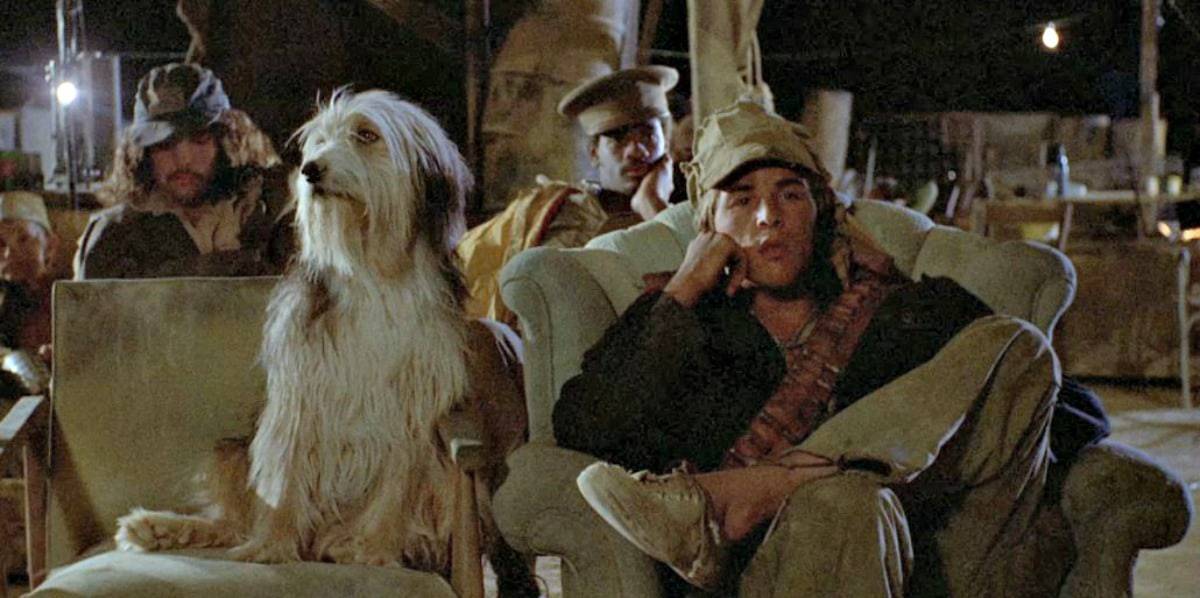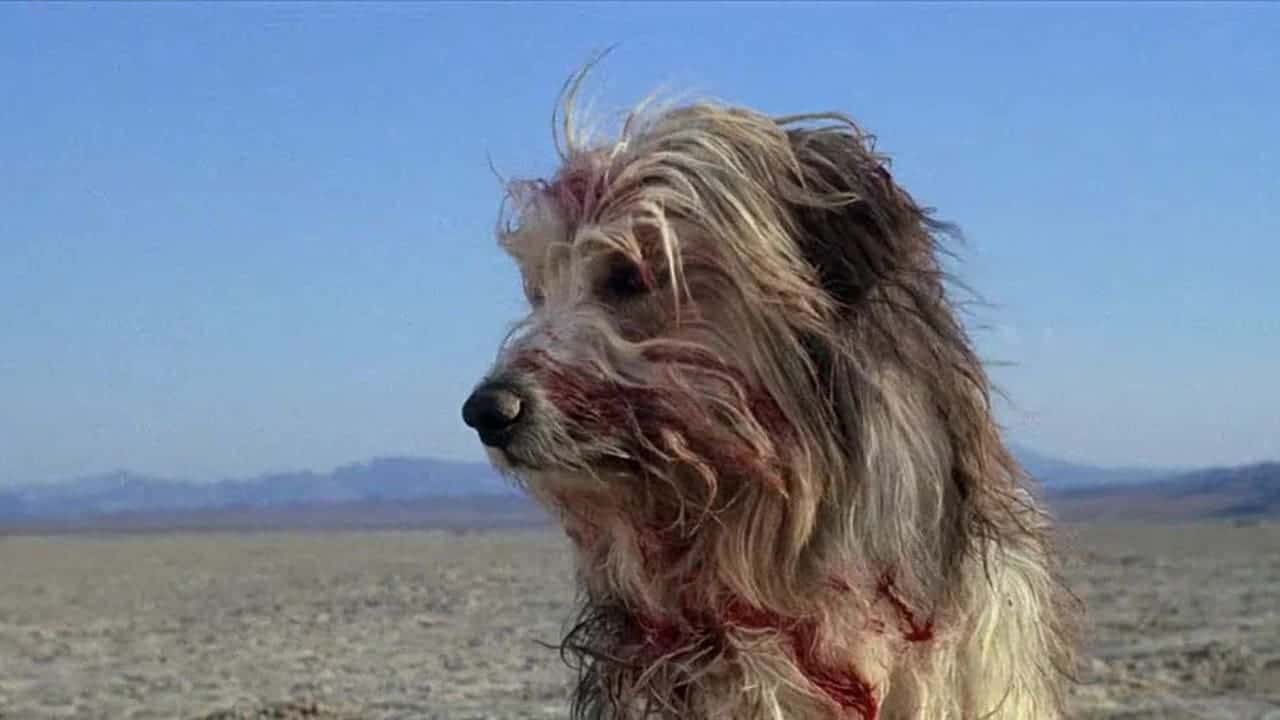When the writer’s job is to go to bed angry and wake up angrier, the resulting cinema is bound to infuriate.
No one had an easier time getting mad than Harlan Ellison. All he needed was a question, and the erupting answer would cut through any amount of “Maybe, Um” optimism. He had no time for concerns masked with pleasantries. To bastardize and misquote Ernest Hemmingway by way of Seven, “The world is a horrible place and worth fighting for.” Ugh. Ellison would have hated that, but such trite tactics are often all pinheads like myself have at our disposal. The idea is a shortcut to the righteous rage that gave the author purpose.
Ellison’s mission was to remain perpetually pissed, and he doesn’t need me to explain his ethos. As he stated in his 1974 essay, “Somehow, I Don’t Think We’re In Kansas, Toto” the obligation of the writer is “to go to bed angry and to rise up angrier the next day.” If you dared to direct a proposition his way, you better be as equally prepared to receive both barrels.
What questions stoked his fire? Where did he get jelly beans? Does the god of love use underarm deodorant? Why is the sky blue? Why is water wet? Didn’t matter. His stories were his answers to your absurd questions. Ellison raised hell because to do any less would be a betrayal to the passion that fueled him.

There are many answers in his novella, “A Boy and His Dog.” All of them stirred forth from his disgust regarding humanity’s descending direction in 1969. Raised on the cynicism of The Time Machine, Brave New World, and 1984, Ellison relished in slapping his fellow man with a dark dose of certain doom. Our intelligence is not a gift but a curse. You can’t simply split the atom and think you’re going to walk off into the sunset.
Due to his passion for the short form, Ellison’s stories rarely gained mass attention. Perusing through a myriad of online obituaries these past few days, I’ve noticed a lot of love for his Star Trek script, “The City on the Edge of Forever” and his legal assaults upon James Cameron for cribbing elements of his Outer Limits episodes (“Demon with a Glass Hand” and “Soldier”) for The Terminator. His reputation as a tenacious champion for the rights of the writer is unparalleled, but it also infuriated a section of the community. While some raised their fist in solidarity, others rolled their eyes at his ego.
Ellison had a tremendous impact on television (ironic considering how much disdain he famously displayed for the boob tube in “The Glass Teat”), but Hollywood rarely came calling. Films were often inspired by or straight up stolen from his fiction. There are really only two properly cinematic executions of his work: the abysmal 1966 fiasco known as The Oscar, and L.Q. Jones’ low-fi psychedelic adaptation of “A Boy and His Dog.”

While Ellison initially accepted the task of reimagining his story for the silver screen, exhaustion and that dreaded writer’s block eventually stunted his contribution. Jones, along with an uncredited Wayne Cruseturner and producer Alvy Moore, finished the job. The resulting screenplay is a viciously weird apocalyptic vision, true to the spirit of Ellison’s anger, plus the bonus of few seventies colloquialisms.
A couple of years before Mad Max roamed the wastelands of Australia, Don Johnson’s Vic scavenged the leftover shantytowns of a nuclear-seared America. Stripped of familial-bred notions of decency, Vic’s needs are as simple as a Cro-Magnon: food and sex, sex and food. There is no concept of work, to survive Vic must steal from the weak and evade the reprisal of the strong.
To achieve this banal existence, Vic is aided by a nihilistic, albeit telepathic, canine mutt named Blood (voiced by Tim McIntire who also provides the score/soundtrack alongside The Doors’ Ray Manzarek). The hound is an antagonistic voice of repulsion, happy to sniff out Vic’s desires, but only from a place of judgment. Man’s best friend is equally displeased with his station in life.

One night while they are killing time watching nudie films at an outdoor movie house, Blood catches the scent of a female human scrounging within an underground warehouse. The two capture the teenage Quilla June Holmes (Susanne Benton), who protests that she has escaped from the mythical subterranean paradise known as the “Downunder.” Blood takes an immediate distrust of his prey, but the notion of bottomless utopian pleasures entices Vic. Sit, boy.
Leaving Blood behind, Vic follows Quilla June below and discovers a lurid wonderland trapped in the memory of a pre-annihilated America. Men and women cake their faces in white greasepaint in an effort to reclaim the happy complexion of yesteryear and dress their bodies in vintage fashion. Compared to the canned mystery meat dinners up top, the Downunder is a scrumptious feast of plenty. Vic’s basic needs are dished out at every opportunity, and for the first time in his life, there is a terror of gluttony.
Endless pleasure is, of course, a fallacy. Harlan Ellison’s particular brand of speculative fiction is always eager to confront its heroes with the alarming axiom, “If it’s too good to be true, it probably is.” There is no happy ending for you here, Vic. Whatever satisfaction there is for him can only be found in accepting the hellscape he was born into. That’s all our misery. We work with what we’ve got.

The second Quilla June introduces Vic to dear old dad, the boy should have run. Jason Robards’ Lou Craddock hides a metaphorical row of shark’s teeth behind his smile. His good country doctor routine is practically fading from reality with each false kindness. In a universe of probable atrocity, Craddock raises a red flag with a sparkle in his eye. The big bad wolf can barely hold onto granny’s clothing.
Both the novella and the film are wrestling with all manner of furor. The Kennedys were dead. Martin Luthor King Jr. assassinated. Vietnam and Watergate uncovered a poison pumping through our infrastructure. Peace and love perverted by Charlie Manson. We choked on the American Dream, and the apocalypse seemed like a necessary, revelatory Heimlich maneuver.
Vic is Ellison’s ultimate judgment on humanity. With life reduced to starvation as normalcy, the boy adjusts to his primal urges. There is no fellow man. The other guy is just there to take your stuff, so you have to take it first. Darwinian law is not only supreme; it’s fetishized. Ellison calls bullshit on Mad Max’s struggle with morality on the Fury Road. The moment you trust in the fantasies of the Downunder is the moment they snap into a nightmare and threaten to squash your very existence.

Ellison was never satisfied with the adaptation. Concerned primarily with the flack he caught from critics labeling the story misogynistic, Ellison screamed his frustrations upon L.Q. Jones. As he detailed in his introduction to the Vic and Blood graphic novel adaptation, “I have no trouble placing the blame on that sexist loon Jones…He was brung up in Texas, and as a good ole boy he is pretty much beyond retraining.” My fault? Not it.
The film is ugly. It is true that where Ellison’s novella stuffs its appetite in the indecency of both sexes, allowing Blood to be the cultured magistrate, Jones’ interpretation lingers too long on scenes of rape and climaxes with a joke to soothe an unfathomable horror. The final line snickers when it should probably settle into resolute discomfort, or at least, stifled and ashamed humor. One can easily forgive the author’s disappointment.
Still, as a film, A Boy and His Dog packs a mean punch and offers a taste (probably a poor choice of words for those already familiar with the story…sorry, not sorry) of Harlan Ellison’s mandatory rage. The answers within are as furious and as relevant as ever. Our planet is not the Eden fed to us in storybooks; it’s just the third rock from the sun. The time here is limited. Get angry. Press play. Make change.
The post Harlan Ellison Got Mean with ‘A Boy and His Dog’ and We Deserved It appeared first on Film School Rejects.



we need your feedback